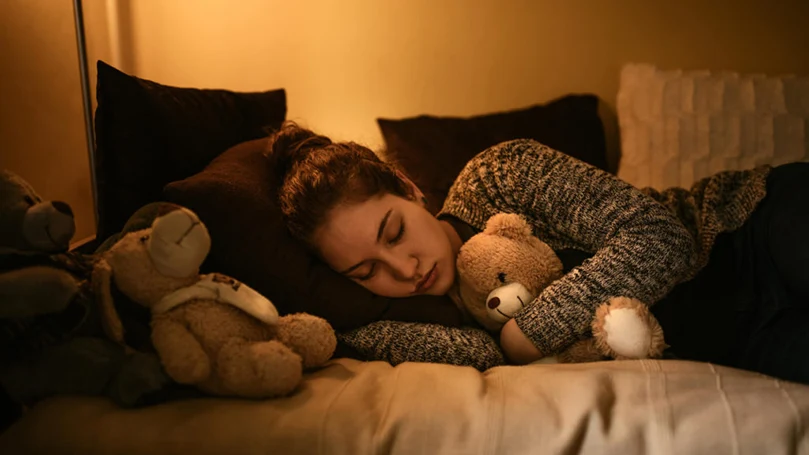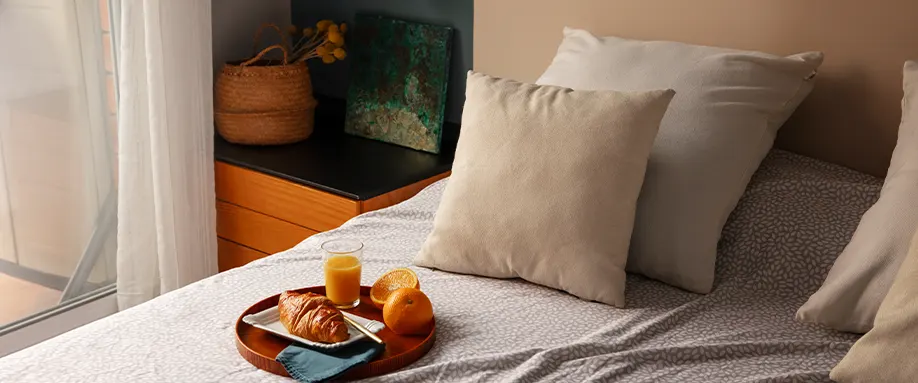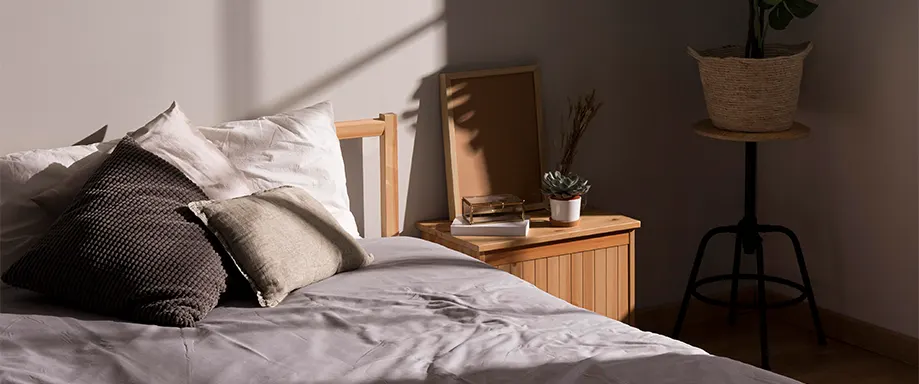Lower the heat
Cranking up the heat may seem like a cosy way to spend an evening, but it can also really wreak havoc on your sleep. As we sleep, our body acclimates to the room temperature. If we lower our body temperature a little bit in a cooler room, we tend to sleep better. While the exact thermostat is a matter of personal comfort, optimal temperatures tend to range between 20 and 22 degrees oC. Instead of having one big comforter, we suggest piling on light layers on your bed so that you can remove them if it becomes too warm.
Don't keep the room too cold
Not to sound like Goldilocks, but it’s important to keep the temperature just right — similar to how a too-warm bedroom can keep you up at night, being too cold isn’t conducive to sleep either. While you may be saving on the heating bill, shivering and teeth chattering is uncomfortable, and can keep you awake at night, Decker says. So find a comfortable temperature and maintain it, at least while you’re falling asleep.

Avoid heavy metals
A hardy meal may have a way of warming you from the inside out during those cold winter months, but it can also keep you up at night. When you eat a heavy meal in the evening, the body has to work harder to digest that food, Decker explains, which can actually keep you awake. He tells patients to aim to finish up mealtime four or five hours before bedtime to allow full digestion of food. If you are a late night eater, there are snacks before bed time that you can eat.
Exercise
There have been some nice studies that demonstrate that exercise can increase deep sleep. But, unfortunately, during the winter months we tend to feel sluggish and stop using up all our energy. For increased movement, and better rest, you could go for a simple brisk walk or opting for the stairs instead of the elevator to improve step count during the day.
Try not to oversleep on weekends
While this is a year-round struggle, the cold dreary days of wintertime have their own special way of making us want to stay in bed all day on the weekends. Unfortunately, though, altering sleep too much on Saturday and Sunday can set you up for bad patterns during the weekdays. While recapturing a little bit of sleep is great, try to avoid altering your bedtime and wake time by more than an hour or so.
Avoid dry air
That dry, cold winter air in your bedroom can really zap the moisture out of the nose. And when our nose dries out, we tend to open our mouths and start snoring, which can be the start of bad sleeping patterns. We recommend a humidifier or even a little waterfall to keep air moist — and the comforting white noise of both is an added bonus that can help to lull you to sleep. Additionally, you can spray sleep spray or use essential oils as wellWinter is specific in terms of sleep environment, because of cold and dry air. Some of us have difficulties to sleep because of aforementioned reasons, and also because of shorter light emission during winter. There are some ways to improve sleep quality in the winter, and they mostly revolve around adjusting temperature and light levels in your bedroom. Of course, it wouldn’t hurt to skip heavy meals and avoid dry air in the room, or to keep your nasal airways clean.
Keep your nasal airways open
Sleep helps us heal. But the irony of that is that when we’re suffering from a cold or flu, we’re often too stuffed up to get a good night’s rest. When we sleep, nature intends for us to breathe mostly through our nose. But when our noses are stuffed up, we naturally compensate by opening our mouths, which can lead to snoring and, generally speaking, a pretty bad night’s sleep. You can try anything that can help to open the nasal passages before sleep, whether that’s breathing in warm, moist air, trying a nose passage-opening product, or keeping the head elevated. You can also use a humidifier to ease sore and taking a bit of honey before bedtime.
Conclusion
Sleeping in winter is specific in terms of sleep environment, because of cold and dry air – unlike sleeping in hot weather when you have dry air but hot air. Some of us have difficulties to sleep because of aforementioned reasons, and also because of shorter light emission during winter. There are some ways to improve sleep quality in the winter, and they mostly revolve around adjusting temperature and light levels in your bedroom. Of course, it wouldn’t hurt to skip heavy meals and avoid dry air in the room, or to keep your nasal airways clean.















There are no comments yet
"*" indicates required fields